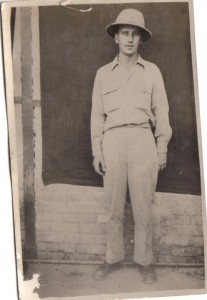This is a somewhat personal post, or at least I am using personal experiences to make a larger case about the learning of emotional intelligence, or even maturity, as an exercise in perpetual reflection. Whether or not this type of learning ever makes it on to a formal curriculum or is encapsulated by a formal pedagogy is besides the point. I think quite a few of my posts put forth the idea that education will mirror society in that we are seeing a shift towards decentralization, the breakup of larger units of organization, in favor of the enhanced individual, aka the freelancing self. Organizations unto themselves. Reliant on ambient networks of affinity, but beholden to securing their own future, perpetually responsible for their own learning. A lifelong learner as freelancer. Hence, a need for understanding emotional intelligence.
Emotional (or perhaps even social) intelligence is as much a harbinger of eventual success (however defined) as talent, skill, or even education (in my estimation). It is the emotional maturity to know what is happening, why it is happening, how it isn’t the blind machinations of fate, and how best to respond (even if the best response is no response-this is the one I am learning now).
The ‘stuff’ of emotional intelligence, the pivot points on which we make our decisions, is memory. Shards of memory, real or heightened, blurred, crystal clear, etc. Memory as events, memory as emotional specks stolen from larger matter, memory as raw emotion from decisions both good and bad. Memory is the ‘stuff’ that emotional maturity is built against and reflected upon. It is a tangible marker of progress. It is the activity of the emotional take on activity theory (I imagine Vygotsky is rolling in his grave right now). But activity theory works well for this, if the empowered learner is willing to treat themselves as agents in the phenomena under study. Activity theory is concerned with “finding patterns and making inferences across interactions, describing phenomena and presenting phenomena through a built-in language and rhetoric”. Generally, it focuses on activities as the unit of analysis, the interaction of a subject (us) with an object (memory) through the use of a tool (reflection). The reflection that stems from this subject/object interaction is transformative (as all learning is to some degree) and in emotional intelligence, that is especially true. We transform our cognitive and emotional understanding of the world through reflections of our past encounters with it.
So, here is my meta-narrative. I have returned to Seoul, Korea after five years away. I lived here for eight years in the past. I return to find a familiar, yet different place. I take long walks to old haunts, many of which are closed. I experience certain exhilirating moments of bewilderment (a real good dose of what it is to live abroad). Yet, I am certainly not as charged up by events that once thrilled me the first go around here. Others have taken their place, but the Michael Gallagher of 2011, I suspect, is a bit more measured, more emotionally calculated and balanced than his 1998-2006 counterpart. Seoul has changed at its own pace, but our paths have been divergent for quite some time now and we are reacquainting ourselves. Like family you haven’t seen in awhile, we have enough emotional history to make the investment in learning each other again. But much of what I remember, those emotional memories I held dear, are not here. They were precise intersections of time and space (subjects?) through me (objects?) and I am able to reflect on that now with tools (blog!). But this isn’t just memory for memory’s sake. Our emotional intelligence depends on our understanding of memory as proscriptive. It directs our understanding and decisions in this moment, right now.
Memory is deceptive because it is colored by today’s events- Albert Einstein
This is important as memory is not an absolute (and collectively, we need to ascribe to the strictest standards for avoiding this type of fallacy in our history), but rather a reflection on the past through the present. It shifts. My memory of Seoul shifted each year I was away in Princeton. 2006 was different than 2010. None were more relevant than any other except for the time they were being experienced. Then they were relevant (having impact) even if they weren’t historically valid (accurate). Constant, transparent reflection reveals these shifts and allows us to embrace this movement without sacrificing accuracy. We can monitor our own shifts in respect to our pasts. A constant orientation, compass.
Many a man fails as an original thinker simply because his memory is too good- Friedrich Nietzsche
Yes, forgetting, or at least accepting memory is often the only means of pushing on and progressing in life. Traumatic events, once engrained on the psyche can be disruptive to the point of paralysis. Emotional intelligence is a constant quest for lemonade with the thousands of lemons we have been handed emotionally in this life. Some of them are just too sour to use so throw them away.
It is sadder to find the past again and find it inadequate to the present than it is to have it elude you and remain forever a harmonious conception of memory- F. Scott Fitzgerald
Fitzgerald has something here that is indeed more difficult to find the past inadequate to the needs of the present, but I might argue that the current present (the present present?) is not the perpetual present and that the present of some future stage in our development might find these memories useful. It is a cabinet of curiosities, retrievable as needed. Sad as it is, it is necessary to confront memory as aiding or inhibiting the development of the present self. Much of our memory actually inhibits development as it allows us to flee the painful flux of the present. But in that change comes growth, emotionally and intellectually.
Pictures and shapes are but secondary objects and please or displease only in the memory- Francis Bacon
I would argue that indeed what Bacon says of shapes and objects and their effect on emotion (please or displease) is true, but shapes in particular are beacons for navigation in this life. We look for pattern language in this life, repetitive bits of a cypher that we use to unlock our future development. A picture of my grandfather standing in Persia in 1942 informs my (not always conscious) take on how a man can present himself, in posture and dress with confidence. How eyes can be defiant, fierce creatures. Shapes that make us pause to reflect. Views from Seoul mountaintops. The perfect symmetry of Gwanghwamun straight to the mountain. Pictures and shapes are harbingers of emotional context, but not necessarily emotions themselves. They let us know that we have entered a contextual environment where emotions might occur. A green light to feel something. This explains the anxiety I feel each time I pass through Newark Airport and look at that big board of flights. That image causes emotion precisely because I know I will never get out of there as scheduled.
The struggle of man against power is the struggle of memory against forgetting- Milan Kundera
This is my closing and it is a good one. Lest we think this pursuit of emotional intelligence, maturity is a bit self-centered or even beneath us to a point, we should know that all that rages in me, emotionally, is writ large in society. The micro is the macro. Our struggle against fading memory is pure definace, a futile one ultimately. Society struggles against itself perpetually to glean meaning from the past to inform the ephemeral present. At times, there will be violence in this struggle, much as there is in our hearts and minds at any given times. A long night of the soul becomes civil unrest, the way forward is cloudy in our hearts and in our communities. Emotional intelligence is necessary to weather these cloudy presents. And it does relate to larger society; society has its own emotional barometer that will twist and turn until it breaks and is reborn. We must follow this same path so embracing this not merely as coincidental happenstance but rather as an actual learning discipline, a pursuit, is warranted.


